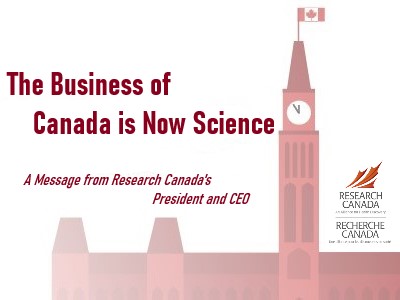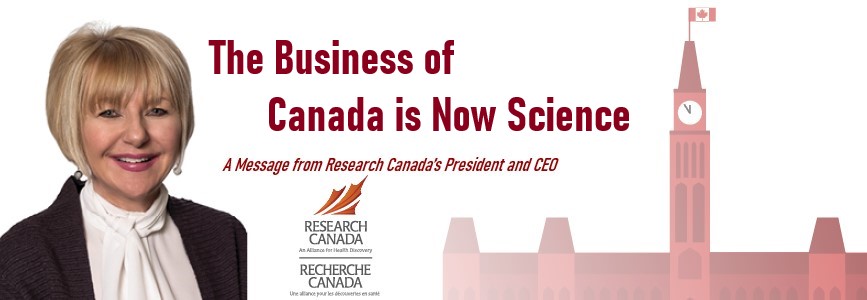

April 14, 2020
I read a recent article in The Atlantic by Derek Thompson about The Four Rules of Pandemic Economics. The fourth rule, according to Thompson, is a plea for a lot more science. He posits that it is our lack of knowledge about COVID-19 which is our greatest weakness in combatting it. I could not agree more!
There are so many unanswered questions about this virus and every day we learn something else we didn’t know. Now, more than ever, governments around the globe are relying on their research communities to be the lanterns of hope and the sobriety whisperers in a drunken deluge of misinformation that causes fear and panic. I have never been so impressed as I am now witnessing such a collective rising to the occasion among health researchers including graduate students and postdoctoral fellows, our health and biosciences community and our charitable and health professional organizations in the fight against this pandemic which threatens our livelihoods and our lives.
As we say in our recent letter to the Prime Minister: “During a public health crisis like the one we are currently in, the critical value of Canada’s health research and health innovation ecosystem—and in particular, our research hospitals and academic health science centres—to the health and wellbeing of Canadians is made all the more clear. Our sector has responded to [the Government’s] call for ‘all hands on deck’ during these challenging times, providing necessary clinical support and working diligently to develop treatment and preventive solutions for COVID-19.”
But the academic health science centres’ critical research funding partners—the health charities and the health and biosciences industry—are struggling to maintain their research support as they too are rising to the occasion to contribute to COVID-19 efforts.
What’s more, our health charities are facing significant challenges in the wake of COVID-19 with a huge dip in fundraising due to the cancellation of signature events and programs. With the plunge in financial markets, charities are also seeing a decline in philanthropic giving in general.
Research Canada is dedicated to working in concert with the Health Charities Coalition of Canada (HCCC) and through our own Alliance to profile the important contributions that Canadian health charities are making to address COVID-19 to both Parliamentarians and Canadian health and science journalists. We will also reinforce policy positions that, for example, seek to ensure Canadian health charities have access to the 75% wage subsidy program recently put forward by the Government of Canada.
As Connie Côté, CEO of the HCCC says, “Now more than ever, the involvement and impact of health charities is being felt across the country. Our members are working around the clock to support Canadians at home, providing up-to-date information on how to best manage your health under these new circumstances and supporting some of the most vulnerable in our society.”
The Power of Data and Digital Tools
The COVID-19 pandemic is shedding light on the power of data and digital tools to protect and improve Canadians’ health and wellbeing—and exposing the work that remains on the journey toward health care digitization. As Dr. Ryan Wiley, Policy Advisor to our Board of Directors and President of Shift Health says in his upcoming editorial for the Canadian Science Policy Centre (CSPC), until we optimize data collection, sharing and analytics and fully enable the acceptance and adoption of innovative digital tools, we are missing opportunities to respond to health emergencies and deliver effective, patient-centred care every day. Stay tuned for more!
Collaboration is Key in the Fight Against COVID-19
Canada’s health and biosciences industry has been in the global fight against COVID-19 from the beginning, joining together with institutions and governments around the world to facilitate research and development of treatments and vaccines for the disease. Innovative Medicines Canada’s (IMC) member companies in particular have been making critical contributions to research and diagnostic testing and equipment. They are also helping to financially support organizations and frontline health care workers and have donated crucial supplies including surgical equipment, antibiotics, disinfection equipment, protective clothing, masks, gloves and more. Visit innovativemedicines.ca/covid-
Canada’s medical device and technology companies, including RC Member GE Healthcare Canada and Partners like Medtronic are also working around the clock to scale up their manufacturing capabilities to ensure that health care workers on the front lines around the world have access to the critical devices and technologies—like ventilators and mobile X-ray systems—that they need to diagnose and treat COVID-19 patients.
Some Members on the Front Lines: Universities are Making Important Strides
Research Canada’s university Members are playing a vital role in addressing COVID-19. Many have been among the recipients of the Government of Canada’s COVID-19 rapid-response funding, including McMaster University, the University of Calgary, the University of Saskatchewan and York University.

University of Saskatchewan: Dr. Darryl Falzarano, a Parliamentary Health Research Caucus alumnus who presented at the 2017 reception on biotechnology in health research, is leading a team of researchers at the University of Saskatchewan and VIDO-InterVac in the global race to find a COVID-19 vaccine.
McMaster University: At McMaster University in, Dr. Karen Mossman and her team of researchers has isolated the novel coronavirus, allowing them to make and share research samples with other research teams across the country to enable their own critical research to fight COVID-19.
York University: During a public health crisis, the importance of public and social policies in responding to and managing the spread of outbreaks has come into stark reality. This is not news to the three York University researchers who are the recipients of over $1.1 million in research funding to explore how public fears and social perceptions of risk affect public health efforts.
University of Calgary: It’s not just our university research labs that are making a difference—medical students at the University of Calgary have also stepped up to the front lines and have helped to quadruple Alberta’s COVID-19 contact-tracing capacity.
Launch of Research Canada’s COVID-19 Webpage
Research Canada has launched a COVID-19 Information and Resources page on our website to help our community find reputable resources about COVID-19, stay up-to-date on the steps our federal and provincial governments are taking to mitigate the impact of the pandemic and to get the latest news on how the health research and health innovation sectors are responding. We will be updating this page regularly as new information becomes available, so please visit rc-rc.ca/covid19 and share these resources with your networks.
Other resources of note are CanCOVID, COVID-19 Resources Canada and Cognit.ca, three online collaboration tools for Canadians in the fight against COVID-19. The newest of the three, CanCOVID is an expert community of Canadian COVID-19 researchers, clinical collaborators and health care stakeholders from across the country launched by Canada’s Chief Science Advisor, Dr. Mona Nemer, to optimize Canada’s research response to the crisis. This online tool joins COVID-19 Resources Canada, a one-stop shop for those who need COVID-19 resources and connections to those who have extra capacity or materials, and Cognit.ca, which offers a central search engine for researchers, research facilities and intellectual property based out of Canadian universities. We encourage you to check out each of these valuable and important resources.
A Final Thought
Telling hard truths during scary times like the one we are now in with COVID-19 is difficult. The key is to help Canadians face the hardest facts without reserve while keeping their hopes up during this pandemic. This is called the Stockdale paradox, after Vice Admiral James Stockdale, who survived years of torture as a prisoner of war. Stockdale attributed his survival to the fact that he “never lost faith in the end of the story,” unlike those “who said, ‘We’re going to be out by Christmas.’ And Christmas would come, and Christmas would go. Then they’d say, ‘We’re going to be out by Easter.’ And Easter would come, and Easter would go. And then Thanksgiving, and then it would be Christmas again. And they died of a broken heart.”
In Stockdale’s words, sage counsel for all of us now: “You must never confuse faith that you will prevail in the end—which you can never afford to lose—with the discipline to confront the most brutal facts of your current reality, whatever they might be.”

